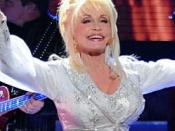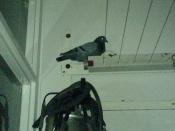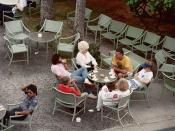The reading of belonging in Cloudstreet is one of the more apparent and dominant readings. We as human beings have an innate need to belong, which makes the reading all the more prominent for the reader. For Winton to put such a focus on belonging in his book, he must have struggled with belonging sometime during his own life. Although we are told that as a child he had a close-knit family where everyone belonged, no matter how strange they were. Initially in Cloudstreet, no one belongs anywhere. The Pickles end up in '... this great continent of a house ... They're lost.' (Page 41) The Lambs, who '... can't stay in a town when everything blows up in your face - especially the only miracle that ever happened to you.' (Page 47) are just as lost, '... at the very end of their choices ... Number One...'
(Page 47) As the book progresses, all the characters struggle to find a place of belonging of their own. They all look in different places, Oriel moves into the tent, Lester seems to realise that he belongs with his family, Quick leaves, Rose becomes anorexic and dreams of escaping, Dolly becomes an alcoholic and has numerous love affairs, and Sam gambles and tries to commit suicide. Fish knows he belongs in the water, with the water, which represents his other half, the half whom he has longed to join since the accident. Fish's search for the water represents the other members of the Lamb-Pickles family searching for their place of belonging.
By Oriel moving into the tent, she is acknowledging that the house is 'saying to her: wait, wait.' (Page 134) The house is telling her to wait for belonging and 'Oriel wasn't the sort to argue...


